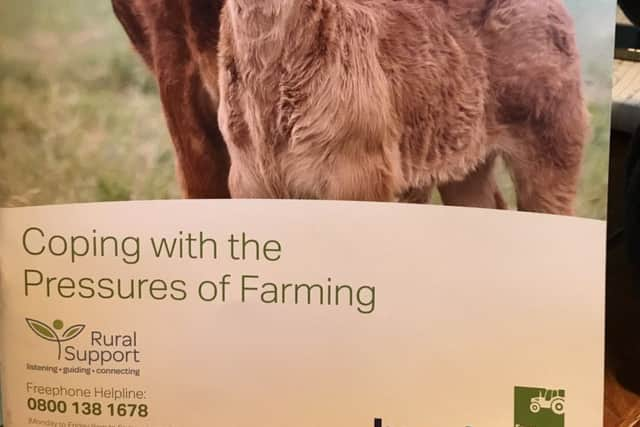NI farmers more at risk of accidents


The small scale nature of the province’s industry means farmers are often lone workers, or with just a son in the business, they are often working under pressure and this can lead to accidents happening.
This was the message of Health and Safety Chief Executive Robert Kidd as he met stakeholders and farming families at last week’s busy Balmoral Show.
Advertisement
Advertisement
Mr Kidd, who took up his new role at the end of January, said Balmoral provided the perfect opportunity for him to engage with key stakeholders in the industry and the farming community in a much more informal setting to get the vital message of farm safety across.


“Our theme for the show is ‘keeping farming families safe’ so it’s not just about the farmers, we are also interested in the children,” he explained.
“It’s a great opportunity to talk to the children and run a competition for them. Kids live on farms, they grow up on them, you can’t keep them away from it so this is a great opportunity to talk to them and make sure that they are learning that equipment is dangerous, slurry gas is dangerous, the animals can be dangerous and it’s all those issues.
“We just want to get the safety message out there - not try and take away from the fun of the occasion but just to make people realise that farming is by far the most dangerous occupation. The fact that animals can turn, the equipment farmers are using is dangerous, farmers tend to work very long hours, working under stressful conditions. When they are stressed they make bad decisions so that’s when things start to go wrong.
Advertisement
Advertisement
“Last year we had seven farm fatalities, so seven people went out to do a day’s work and didn’t come home,” he added.
“The actual accident statistics for agriculture is a really difficult one because there is a culture and a huge amount of under reporting. A farmer will not report an accident. If he is walking wounded he will say ‘I’ll get on with it’. He doesn’t want to report it because he thinks the inspectors will be out to see what he has done wrong and what we are trying to say is that what we do is not all about regulation enforcement - yes that is our role and we can’t negate that but as an investigator we can stop the accident happening in the first place.”
In relation to the fatality statistics Mr Kidd said it was fair to say that farming in NI is quite different to the rest of the UK and NI farmers are more at risk of suffering a serious accident because the farms here are on a smaller scale.
“Northern Ireland’s farming profile is predominantly very small farms so it is the farmer and son or the farmer on his own so they do tend to work under a huge amount of pressure. If the weather is good like this they are trying to get in silage, they are working to very tight deadlines - 18 hour days are not unheard of and that is when things start to come apart.
Advertisement
Advertisement
“If you have a larger farm you tend to work more like the construction sector. There are more people and you can spread the load which can take the pressure off.
“Farmers are working even when they are not feeling well, they are still out there doing it and it is that pressure which creates risk.
“We are trying to educate people by saying ‘look you need to think about these things’, get away from this mindset that it won’t happen to me because unfortunately the people it happened to probably said the same thing. So it’s trying to change that mindset.
“The other thing we are also looking at is mental well-being. Farmers will talk about being under pressure, yet farmers don’t get stressed - and we are saying stress might be the reality of it, it is the pressure.”
Advertisement
Advertisement
A new joint resource involving Rural Support and the Farm Safety Partnership was launched at last week’s show. The booklet entitled ‘Coping with the pressures of farming’ aims to bring together practical information on a broad range of farming matters and presents them in a direct and accessible manner. The book is designed to provide practical help and guidance in dealing with the pressures which are often encountered and sign post farmers and their families to sources of help and advice.
Robert said the book gives a lot of useful information - it’s all information that is already available but it brings it all together in the one publication
He added: “It gives simple little things to ask yourself in a questionnaire where you maybe think you’re not stressed but when you start to tick down through the questions all are indicators of stress, If you are stressed you are not focusing, and if you are not focusing should you be driving a vehicle, should you be operating heavy machinery?”
Mr Kidd says HSENI is trying to work now to be seen as an educator rather than a regulator.
Advertisement
Advertisement
“Our education officers go into just over 100 primary schools in rural areas and we had an opportunity to interact with around 10,000 children. Again we are working with age relevant material, we are teaching the kids about the risk and at that age the kids absorb it and take that information home.
“We also work with targeted schools in the secondary sector, we work with the agriculture college, any of the colleges that are doing agriculture related courses and we are working with the Young Farmers’ clubs of Ulster. So we are working with primary school children right through to our young people and trying to instil in them what is the essence of good health and safety.
“It’s about saying to them that we are not the fun police, it’s about making sure you do things safely and unfortunately in this environment almost everything you turn to is potentially dangerous so its all about risk assessment. We teach our children how to cross the road, they do it every day without thinking and the workplace, in this case, is their home as well for children growing up on a farm, They need to understand to risk assess.”
Mr Kidd conceded that a fear of prosecution often prevents farmers from reporting accidents.
Advertisement
Advertisement
“If you look at the statistics there are actually very few farmers who get prosecuted,” he said.
“If you have a scenario with farming of a single operator, if they have an accident or someone gets killed there is going to be no public interest in prosecuting the family. If something happens we want to investigate it to see what caused it and how can we prevent it from happening elsewhere. That is a huge thing.
“If you look back at the accidents and statistics 20 years ago the numbers of fatalities in farming were running at 20 plus, two years ago it was six people killed, last year seven so we have come a long way but obviously seven is too many.
“The types of accidents that are happening in farming are life changing because it’s people losing limbs, people falling from heights, slurry fumes. The types of injuries that we are seeing are very serious and life changing and have a massive impact and again it has huge implications for the family and the family business is completely destroyed.
Advertisement
Advertisement
“If there is a young farmer in his 30s and 40s with young children at school and he gets injured his wife and children are relying on the farm for their livelihood.”
Mr Kidd said the work of the HSENI will continue to focus on teaching children and farmers how to risk assess the many dangers there are on the farm.